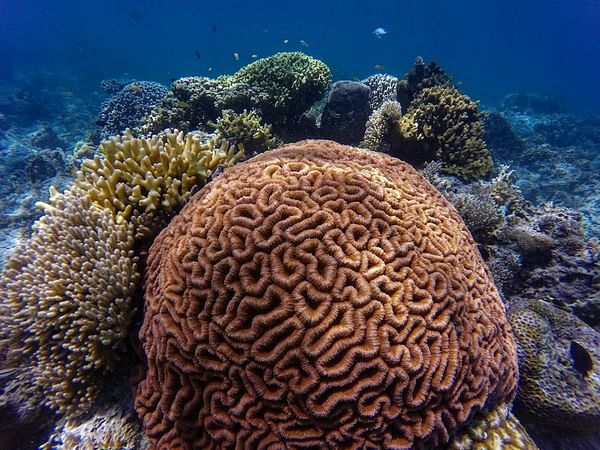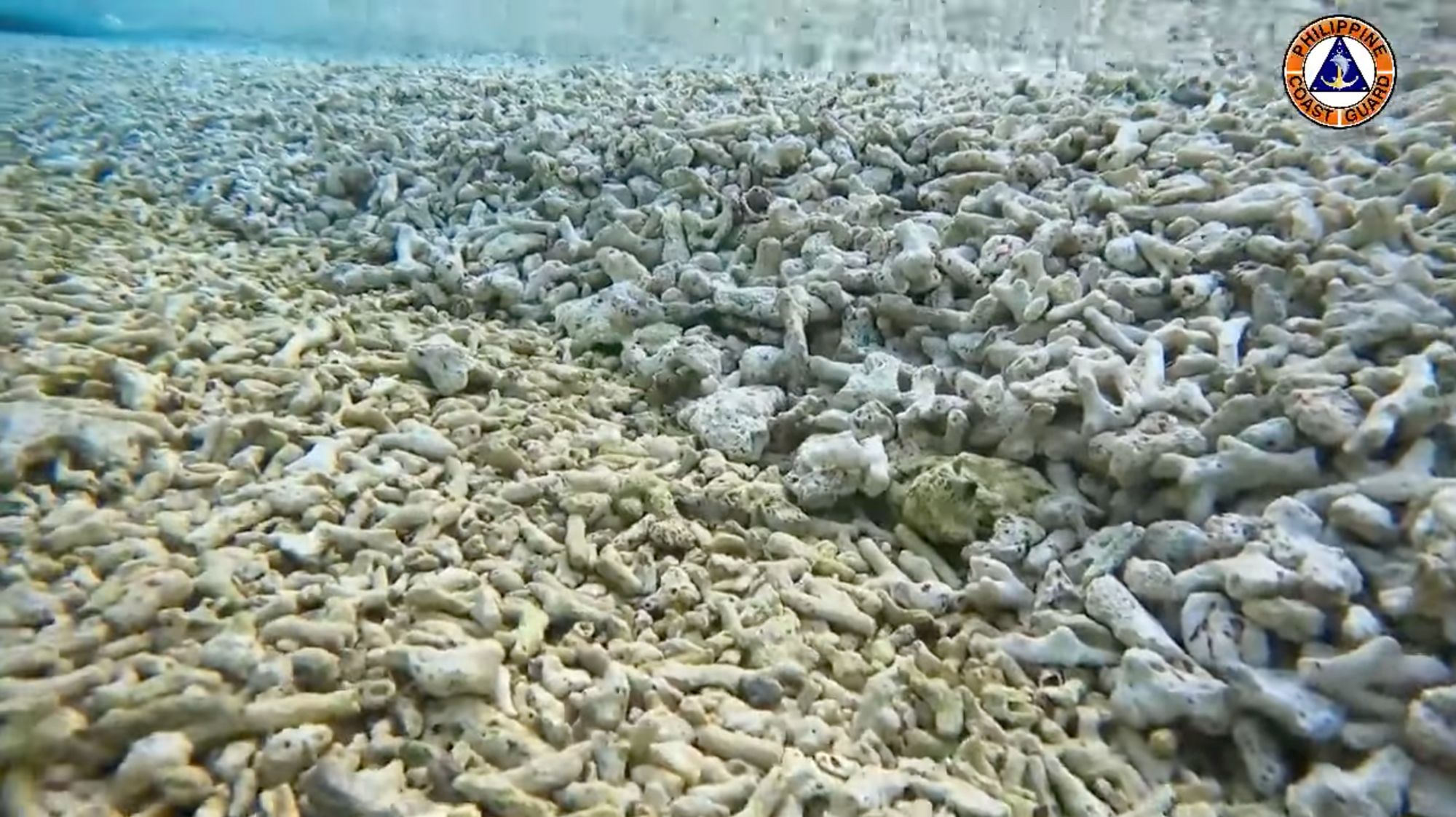China’s Alleged Maritime Militia Faces Accusations of Coral Reef Destruction in South China Sea

China’s Alleged Maritime Militia Faces Accusations of Coral Reef Destruction in South China Sea
In a dramatic turn of events, the Philippines has leveled accusations against China‘s shadowy maritime militia, claiming they are responsible for the destruction of coral reefs in the South China Sea. This revelation has ignited a fresh dispute between the two nations, further inflaming tensions in the hotly contested region.
Just two years ago, the South China Sea boasted vibrant reefs teeming with colorful fish and seaweed. Today, these once-thriving ecosystems have been transformed into desolate wastelands of crushed corals, leaving marine life devastated in their wake. Videos released by the Philippine Coast Guard on a fateful Monday served as damning evidence of the ecological catastrophe that has unfolded beneath the waves.
The affected areas, namely Rozul Reef and Sabina Shoal, lie within the Philippines’ internationally recognized exclusive economic zone (EEZ) in the South China Sea. Both of these underwater features are situated near Palawan, a southwestern island chain in the Philippines that faces the South China Sea. However, the Chinese government has long claimed dominion over the vast and strategically vital waterway, even in the face of competing territorial claims from neighboring nations and contrary to a significant international ruling.
Commodore Jay Tarriela, spokesperson for the Philippine Coast Guard, revealed that divers had conducted comprehensive “underwater surveys” of the seabed. These surveys unveiled a stark reality: the presence of “visible discoloration” that strongly indicated “deliberate activities” designed to alter the natural topography of the seafloor. Tarriela minced no words as he asserted, “The continued swarming for the indiscriminate illegal and destructive fishing activities of the Chinese Maritime Militia in Rozul Reef and Escoda Shoal may have directly caused the degradation and destruction of the marine environment in the [West Philippine Sea] features.”

This accusatory finger-pointing between the Philippines and China has cast a shadow over an already tumultuous region, where longstanding territorial disputes have continually ratcheted up tensions. To delve deeper into the situation, we must examine the key players involved, the environmental consequences, and the broader geopolitical ramifications.
China’s Shadowy Maritime Militia: A Controversial Presence
China’s maritime militia, often described as a shadowy force, has long been a contentious issue in the South China Sea. This unconventional arm of the Chinese government operates primarily through civilian vessels, making it challenging to distinguish from ordinary fishing fleets. Critics argue that these ostensibly civilian ships are frequently used to assert China’s territorial claims and carry out provocative actions under the guise of fishing activities.
The ambiguity surrounding the maritime militia’s role has allowed China to engage in a sort of “gray zone” warfare—a strategy that falls short of overt military conflict but aims to achieve strategic objectives through subterfuge, intimidation, and coercion. This tactic has enabled China to maintain a strong presence in disputed waters while avoiding direct confrontations that could escalate into full-blown hostilities.
Ecological Devastation: The Toll on Coral Reefs
The destruction of coral reefs is not only an environmental tragedy but also a stark reminder of the toll that territorial disputes and militarization can exact on fragile ecosystems. Coral reefs are vital marine habitats that support a diverse array of marine life, from fish to turtles to mollusks. They also act as natural barriers that protect coastlines from erosion and storm surges.
Coral reefs are particularly vulnerable to damage, and once harmed, they can take decades, if not centuries, to recover, if they recover at all. The deliberate destruction of these reefs in the South China Sea threatens not only marine biodiversity but also the livelihoods of local fishing communities and the broader health of the ocean ecosystem.

Geopolitical Tensions: A Brewing Storm
The allegations against China’s maritime militia come at a time when tensions in the South China Sea are already simmering. The region has been a hotspot for territorial disputes involving China, the Philippines, Vietnam, Malaysia, Brunei, and Taiwan, among others. These disputes primarily revolve around competing claims to various islands and waters within the South China Sea.
China’s assertiveness in the region, including the construction of military facilities on artificial islands and the frequent presence of its naval and coast guard vessels, has raised concerns among neighboring nations and the international community. The United Nations Convention on the Law of the Sea (UNCLOS) has been a pivotal legal framework for addressing these disputes, but China has consistently rejected UNCLOS rulings that go against its territorial claims.
The recent allegations against China’s maritime militia have further exacerbated these geopolitical tensions. The Philippines’ decision to publicly accuse China of ecological destruction has drawn international attention and condemnation, with various nations calling for a peaceful resolution to the dispute. The Philippines has also sought the support of the international community, including the United States, to address the issue.
The International Response: Calls for Diplomacy and Resolution
In response to the Philippines’ allegations, the international community has emphasized the importance of diplomacy and a rules-based approach to resolve the dispute. The United States, which has a significant interest in maintaining freedom of navigation in the South China Sea, has expressed its concerns and pledged support to the Philippines.
Other countries in the region, such as Vietnam and Malaysia, have also voiced their concerns over China’s actions in the South China Sea and called for a peaceful resolution to territorial disputes. The Association of Southeast Asian Nations (ASEAN) has played a role in facilitating dialogue and cooperation among member states to address the complex issues in the region.
Conclusion: A Fragile Ecosystem and a Precarious Peace
The accusations against China’s maritime militia for the destruction of coral reefs in the South China Sea have brought to the forefront the environmental consequences of territorial disputes and militarization in the region. These allegations have intensified geopolitical tensions in an already volatile area, raising concerns about the potential for escalation.
Efforts to protect the delicate ecosystems of the South China Sea, including its coral reefs, must go hand in hand with diplomatic initiatives aimed at resolving territorial disputes peacefully. The international community, including regional stakeholders and global powers, must continue to advocate for adherence to international laws and norms to ensure a stable and sustainable future for this critical maritime region.
As the accusations against China’s maritime militia reverberate on the global stage, the world watches with bated breath, hoping that diplomacy and cooperation will prevail over conflict and ecological devastation in the South China Sea.





